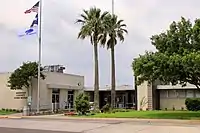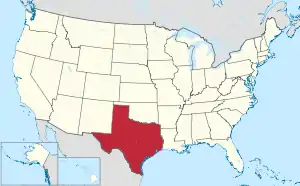Aransas County | |
|---|---|
 The Aransas County Courthouse | |
 Flag | |
 Location within the U.S. state of Texas | |
 Texas's location within the U.S. | |
| Coordinates: 28°06′N 96°59′W / 28.1°N 96.99°W | |
| Country | |
| State | |
| Founded | 1872 |
| Named for | Aransas Bay |
| Seat | Rockport |
| Largest city | Corpus Christi |
| Area | |
| • Total | 528 sq mi (1,370 km2) |
| • Land | 252 sq mi (650 km2) |
| • Water | 276 sq mi (710 km2) 52% |
| Population (2020) | |
| • Total | 23,830 |
| • Density | 94.5/sq mi (36.5/km2) |
| Time zone | UTC−6 (Central) |
| • Summer (DST) | UTC−5 (CDT) |
| Congressional district | 27th |
| Website | www |
Aransas County (/əˈrænzəs/ ə-RAN-zəss)[1] is a county located in the U.S. state of Texas. It is in South Texas and its county seat is Rockport.[2]
As of the 2020 census, the population was 23,830.[3] Aransas County comprises the Rockport, Texas micropolitan statistical area.
History
Spanish conquistador and cartographer Alonso Álvarez de Pineda was likely the first European to encounter this land when he sailed along the Texas coast in the summer of 1519 and charted Aransas Bay. This name is derived from an outpost established during the Viceroyalty of New Spain called "Río de Nuestra Señora de Aránzazu," which was itself named for the Sanctuary of Aránzazu, a Franciscan sanctuary in Oñate, Gipuzkoa, Spain, whose name originates from the Basque language.
In 1871, the Texas Legislature established Aransas County from portions of Refugio County, and it organized the following year.[4]
In August 2017, Hurricane Harvey inflicted tremendous damage on the county.
Geography
According to the U.S. Census Bureau, the county has a total area of 528 square miles (1,370 km2), of which 252 square miles (650 km2) is land and 276 square miles (710 km2) (52%) is water.[5]
Adjacent counties
- Calhoun County (northeast)
- Gulf of Mexico (east)
- Nueces County (southeast)
- San Patricio County (southwest)
- Refugio County (northwest)
National protected area
Demographics
| Census | Pop. | Note | %± |
|---|---|---|---|
| 1880 | 966 | — | |
| 1890 | 1,824 | 88.8% | |
| 1900 | 1,716 | −5.9% | |
| 1910 | 2,106 | 22.7% | |
| 1920 | 2,064 | −2.0% | |
| 1930 | 2,219 | 7.5% | |
| 1940 | 3,469 | 56.3% | |
| 1950 | 4,252 | 22.6% | |
| 1960 | 7,006 | 64.8% | |
| 1970 | 8,902 | 27.1% | |
| 1980 | 14,260 | 60.2% | |
| 1990 | 17,892 | 25.5% | |
| 2000 | 22,497 | 25.7% | |
| 2010 | 23,158 | 2.9% | |
| 2020 | 23,830 | 2.9% | |
| U.S. Decennial Census[6] 1850–2010[7] 2010–2020[3] | |||
| Race | Pop 2010 | Pop 2020 | % 2010 | % 2020 |
|---|---|---|---|---|
| White (NH) | 16,350 | 15,816 | 70.59% | 66.37% |
| Black or African American (NH) | 258 | 241 | 1.11% | 1.01% |
| Native American or Alaska Native (NH) | 118 | 142 | 0.51% | 0.6% |
| Asian (NH) | 443 | 480 | 1.91% | 2.01% |
| Pacific Islander (NH) | 5 | 15 | 0.02% | 0.06% |
| Some Other Race (NH) | 21 | 78 | 0.09% | 0.33% |
| Mixed/Multi-Racial (NH) | 273 | 900 | 1.18% | 3.78% |
| Hispanic or Latino | 5,690 | 6,158 | 24.58% | 25.84% |
| Total | 23,158 | 23,830 |
As of the 2020 United States census, there were 23,830 people, 9,917 households, and 6,303 families residing in the county.
As of the census[12] of 2000, there were 22,497 people, 9,132 households, and 6,401 families residing in the county. The population density was 89 people per square mile (34 people/km2). There were 12,848 housing units at an average density of 51 units per square mile (20/km2). The racial makeup of the county was 87.44% White, 1.43% Black or African American, 0.58% Native American, 2.77% Asian, 0.05% Pacific Islander, 5.33% from other races, and 2.39% from two or more races. 20.32% of the population were Hispanic or Latino of any race.
There were 9,132 households, out of which 27.00% had children under the age of 18 living with them, 57.00% were married couples living together, 9.40% had a female householder with no husband present, and 29.90% were non-families. 25.30% of all households were made up of individuals, and 11.60% had someone living alone who was 65 years of age or older. The average household size was 2.43 and the average family size was 2.90. As of the 2010 census, there were about 5.9 same-sex couples per 1,000 households in the county.[13]
In the county, the population was spread out, with 23.80% under the age of 18, 6.20% from 18 to 24, 23.20% from 25 to 44, 27.10% from 45 to 64, and 19.70% who were 65 years of age or older. The median age was 43 years. For every 100 females there were 98.90 males. For every 100 females age 18 and over, there were 95.50 males.
The median income for a household in the county was $30,702, and the median income for a family was $34,915. Males had a median income of $31,597 versus $20,289 for females. The per capita income for the county was $18,560. About 15.50% of families and 19.90% of the population were below the poverty line, including 31.00% of those under age 18 and 10.20% of those age 65 or over.
Education
Most county residents, including the cities of Rockport and Fulton, are served by the Aransas County Independent School District.
Some residents (including the city of Aransas Pass, which is actually outside of the county) are served by the Aransas Pass Independent School District.
Del Mar College is the designated community college for the county.[14]
Transportation
Major highways
Airport
Aransas County Airport is located in Fulton, north of Rockport.
Communities
Cities
- Aransas Pass (partly in San Patricio and Nueces counties)
- Corpus Christi (mostly in Nueces County with small parts also in Kleberg and San Patricio counties)
- Rockport (county seat)
Towns
Census-designated places
Unincorporated communities
Ghost towns
Politics
Aransas County is a state bellwether for Texas in U.S. presidential elections, having voted for the statewide winner in every presidential election since the county's formation in 1872. It shares this status along with Brown County, Lampasas County, Parker County, Shackelford County, and Young County.
| Year | Republican | Democratic | Third party | |||
|---|---|---|---|---|---|---|
| No. | % | No. | % | No. | % | |
| 2020 | 9,239 | 75.17% | 2,916 | 23.73% | 135 | 1.10% |
| 2016 | 7,740 | 73.63% | 2,465 | 23.45% | 307 | 2.92% |
| 2012 | 6,830 | 70.79% | 2,704 | 28.03% | 114 | 1.18% |
| 2008 | 6,693 | 68.45% | 3,006 | 30.74% | 79 | 0.81% |
| 2004 | 6,569 | 70.88% | 2,640 | 28.49% | 59 | 0.64% |
| 2000 | 5,390 | 65.36% | 2,637 | 31.98% | 220 | 2.67% |
| 1996 | 3,769 | 50.66% | 2,964 | 39.84% | 707 | 9.50% |
| 1992 | 2,826 | 41.74% | 2,246 | 33.18% | 1,698 | 25.08% |
| 1988 | 3,858 | 62.27% | 2,305 | 37.20% | 33 | 0.53% |
| 1984 | 4,352 | 71.73% | 1,696 | 27.95% | 19 | 0.31% |
| 1980 | 3,081 | 60.79% | 1,800 | 35.52% | 187 | 3.69% |
| 1976 | 1,985 | 47.48% | 2,136 | 51.09% | 60 | 1.44% |
| 1972 | 2,037 | 70.48% | 844 | 29.20% | 9 | 0.31% |
| 1968 | 1,076 | 39.63% | 1,222 | 45.01% | 417 | 15.36% |
| 1964 | 602 | 28.65% | 1,492 | 71.01% | 7 | 0.33% |
| 1960 | 792 | 45.31% | 948 | 54.23% | 8 | 0.46% |
| 1956 | 757 | 63.67% | 425 | 35.74% | 7 | 0.59% |
| 1952 | 818 | 61.74% | 503 | 37.96% | 4 | 0.30% |
| 1948 | 235 | 34.31% | 418 | 61.02% | 32 | 4.67% |
| 1944 | 150 | 24.15% | 456 | 73.43% | 15 | 2.42% |
| 1940 | 141 | 20.83% | 536 | 79.17% | 0 | 0.00% |
| 1936 | 60 | 21.66% | 206 | 74.37% | 11 | 3.97% |
| 1932 | 39 | 12.66% | 268 | 87.01% | 1 | 0.32% |
| 1928 | 161 | 51.44% | 152 | 48.56% | 0 | 0.00% |
| 1924 | 75 | 26.98% | 195 | 70.14% | 8 | 2.88% |
| 1920 | 49 | 25.13% | 146 | 74.87% | 0 | 0.00% |
| 1916 | 24 | 11.37% | 179 | 84.83% | 8 | 3.79% |
| 1912 | 7 | 3.11% | 187 | 83.11% | 31 | 13.78% |
See also
References
- ↑ "How to Pronounce: A Cities". TexasTripper.com Texas Travel Guide. September 21, 2014. Retrieved July 19, 2018.
- ↑ "Find a County". National Association of Counties. Archived from the original on May 31, 2011. Retrieved June 7, 2011.
- 1 2 "U.S. Census Bureau QuickFacts: Aransas County, Texas". United States Census Bureau. Retrieved January 31, 2022.
- ↑ "Texas: Individual County Chronologies". Texas Atlas of Historical County Boundaries. The Newberry Library. 2008. Archived from the original on April 12, 2017. Retrieved May 20, 2015.
- ↑ "2010 Census Gazetteer Files". United States Census Bureau. August 22, 2012. Retrieved April 18, 2015.
- ↑ "Decennial Census of Population and Housing by Decades". US Census Bureau.
- ↑ "Texas Almanac: Population History of Counties from 1850–2010" (PDF). Texas Almanac. Archived (PDF) from the original on October 9, 2022. Retrieved April 18, 2015.
- ↑ "Explore Census Data". data.census.gov. Retrieved May 20, 2022.
- ↑ "Explore Census Data". data.census.gov. Retrieved May 20, 2022.
- ↑ Bureau, US Census. "Census.gov". Census.gov.
- ↑ "About the Hispanic Population and its Origin". www.census.gov. Retrieved May 18, 2022.
- ↑ "U.S. Census website". United States Census Bureau. Retrieved May 14, 2011.
- ↑ Leonhardt, David; Quealy, Kevin (June 26, 2015), "Where Same-Sex Couples Live", The New York Times, retrieved July 6, 2015
- ↑ "EDUCATION CODE CHAPTER 130. JUNIOR COLLEGE DISTRICTS". statutes.capitol.texas.gov.
- ↑ Leip, David. "Dave Leip's Atlas of U.S. Presidential Elections". uselectionatlas.org. Retrieved July 19, 2018.
External links
- Aransas County government
- Aransas County from the Handbook of Texas Online
- Aransas County from the Texas Almanac
- Aransas County from the TXGenWeb Project
- Historic Photographs of Aransas County
- RockportFulton.com Local Area Guide